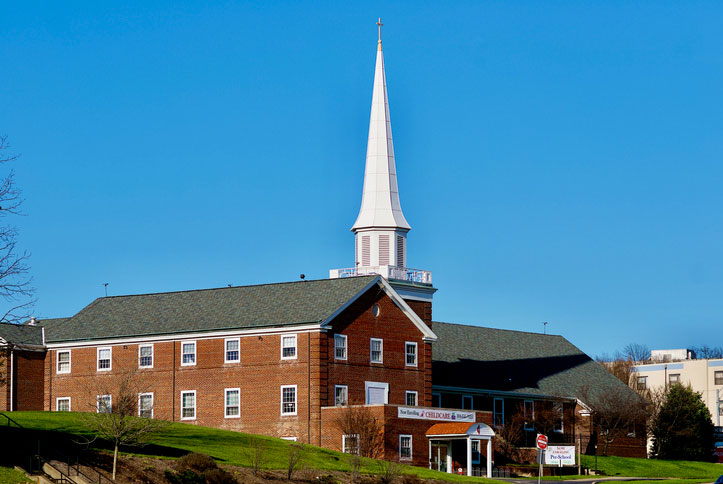
Religion is ingrained into the very core, the heart of West Virginia. The people of this largely Protestant, strongly religious Bible Belt state don’t just practice religion, they live it. It’s part of their culture, their history, and their way of life. Marked by small towns connected with country roads that inspire songs and link multi-generational families, West Virginia is a state built on hard work, humble living, and a deep Christian faith.
 According to the Pew Research Center, 78% of all adults in West Virginia identify as Christians. Of those, 70% are Protestants (largely evangelical), while just 6% are Catholic and 2% are Mormon.
According to the Pew Research Center, 78% of all adults in West Virginia identify as Christians. Of those, 70% are Protestants (largely evangelical), while just 6% are Catholic and 2% are Mormon.
West Virginia’s landscape is where you’ll be inspired to answer your personal calling and begin a life of service in the church, where you’ll spread the Good News of Jesus Christ and share your love of the Lord.
Explore a Christian Ministry Degree – Request More Info Today!
This is your opportunity to begin a journey with God that’s guaranteed to change your life and the lives of those around you.
Here are the steps you’ll want to take to fulfill your calling and learn how to become a pastor in West Virginia:
Steps to Become a Pastor in West Virginia
Step 1. Earn a Bachelor’s Degree in Christian Ministry, Pastoral Studies or Other Similar Major in West Virginia
A bachelor’s degree in an area like Christian leadership, Christian ministry, pastoral studies, or religious studies serves as an outstanding beginning to a career in the church. Whether your career aspirations include working in ministry or outreach, in church operations or in missionary work, a four-year Christian bachelor’s degree will prepare you with the knowledge and skills you’ll need to serve as a competent and knowledgeable religious worker.
You’ll study the history of Christianity and the Scriptures as part of a Christian bachelor’s degree. You’ll also likely complete courses like psychology, communications, and business, all of which are designed to prepare you to assume important roles in the church such as deacon, youth pastor, missionary, and more.
For students with career goals that include graduate study, these programs also serve as excellent precursors to the Master of Divinity (MDiv) and similar graduate degrees.
Step 2. Look for Ministry Jobs and Gain Experience Serving the People and Churches of West Virginia
With a Christian bachelor’s degree on your resume, you’ll be well-qualified to land a job working in outreach, ministry, missionary work, and more. There are plenty of exciting and fulfilling opportunities in West Virginia to kickstart your career in the church.
Many of the Christian programs in West Virginia are focused on pressing social issues like poverty, homelessness, and the opioid epidemic. According to the U.S. Census Bureau, about 278,000 West Virginians – 16% of the population - live below the poverty line. The child poverty rate in the state is nearly 20%.
For example, Union Mission Ministries in Charleston provides services to more than 20 churches, food pantries, and outreach programs throughout the state. They also operate a men’s shelter and an addiction recovery program, provide emergency assistance when needed, and operate an Outreach Ministry that trains local churches to recognize and serve the less fortunate in their communities.
Appalachian Outreach in Wheeling provides the people of Appalachia with life-changing services and resources. Their programs, which are aimed at those struggling to meet the basic needs of everyday life, are largely focused on the delivery of materials like food, clothing, and medical supplies to poverty- and disaster-stricken areas of Appalachia.
Explore Ministry Jobs with One of West Virginia's Many Churches
Local churches throughout West Virginia are often home to plentiful job opportunities. If you’re looking for church jobs and ministry jobs, you’ll be well-served by starting your search with some of the largest churches throughout the state, such as:
- All Nations Revival Center, Dunbar
- Bible Baptist Church, Fisher
- Bible Center Church, Charleston
- Calvary Chapel Princeton
- Chestnut Ridge Church, Morgantown
- Elk Valley Chapel, Webster Springs
- Fellowship Baptist Church, Vienna
- First Baptist Church Shady Spring
- First Congregational United Church of Christ, Huntington
- Grace Life, Culloden
- Grand Central Church of Christ, Vienna
- Greater Mt. Zion Pentecostal Church, Bluefield
- Kilsyth Free Will Baptist Church, Mount Hope
- Maranatha Fellowship Church, Saint Albans
- Mount Vernon Baptist Church, Hurricane
- New Street United Methodist Church, Shepherdstown
- Sycamore Tree Church, Follansbee
Step 3. Earn a Master of Divinity (MDiv) or Similar Graduate Degree in West Virginia and Establish Your Role in Christian Leadership
If you're ready to pursue graduate study, the Master of Divinity (MDiv) or a similar degree like a Master of Theology or an MA in Ministry is likely on your radar. In most cases, you'll need a graduate ministry degree to become ordained, although many students also complete these degrees if they want to land other senior-level titles and jobs within the church or simply advance their knowledge of the Christian religion.
The MDiv and similar ministry degree programs are designed to teach students how to become a pastor, missionary, or other church leader through a theological-focused curriculum. These programs are generally focused on Old and New Testament study and interpretation, theology, and ethics. They also include practical ministry courses like pastoral care and counseling and pastoral leadership.
Many of these programs are offered in a partially or fully online format as to accommodate the needs of today's busy, working adults. An online ministry degree features the same curriculum as on-campus programs while offering course delivery through a convenient, online format.
Salary Expectations for Pastor Jobs in West Virginia
Members of the clergy in West Virginia earned an average salary of $46,530 as of May 2020, according to the Bureau of Labor Statistics (BLS). Those with extensive experience and/or those leading larger congregations earned salaries that more closely reflected the top 10%, which was $89,950 during this time.
Nationally (West Virginia stats were unavailable), directors of religious activities and education earned an average salary of $52,660 , while those serving in these senior-level positions in larger church organizations earned salaries that more closely reflected the top 10%, which was $93,990.
Step 4. Consider Forming a Christian Ministry of Your Own in West Virginia
For some, a personal calling to the Lord includes establishing a church of their own. If planting a church in West Virginia is part of your long-term plans, you’ll need to complement your passion for leadership and service and your love of Jesus Christ with plenty of preparation that includes meeting specific state and federal requirements.
In West Virginia, this includes:
- Reserving a name with the West Virginia Secretary of State’s Business and Licensing Division
- Selecting the individuals who will serve as your board of directors (you’ll need at least three members)
- Appointing a registered agent (the person who will receive all legal notices on behalf of your church)
- Preparing and filing Articles of Incorporation (Form CD-1NP) with the West Virginia Secretary of State’s Business and Licensing Division
At the federal level, you’ll obtain a Federal Employer Identification Number (FEIN) from the Internal Revenue Service (IRS), which you’ll use to open bank accounts, receive donations, and apply for a tax-exempt status. You’ll then register your church at the federal level as a 501(c)(3) nonprofit with the IRS by filing a Form 1023 federal tax exemption application.
You’ll then apply for state tax exemption(s) with the West Virginia State Tax Department by completing Form F0003 and register for charitable solicitation (fundraising) through the West Virginia Secretary of State’s Charitable Organizations Division.
2020 US Bureau of Labor Statistics salary figures and job market trends for Religious Workers, Church Directors, and Clergy based on state data, not school-specific information. Conditions in your area may vary. Data accessed January 2022.








